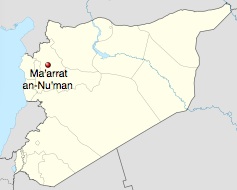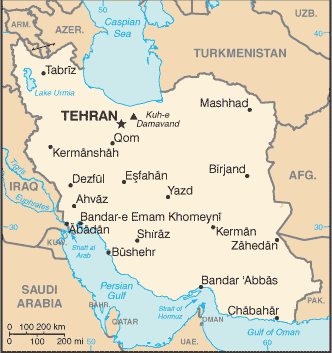As Key Syrian City Remains Contested, Rebel ‘Leadership’ Strained
Rebels Holding Maaret al-Numaan Hope for Reinforcements, But From Who?
by Jason Ditz, November 07, 2012
It has been repeatedly discussed over the past few weeks how important the city of Maaret al-Numaan, currently rebel-held but constantly contested, is to rebel goals. On the highway between Aleppo and Damascus, it effectively cuts Syria’s industrial capital off from reinforcements.
 But as the fighting over the city goes on, the rebels holding it are increasingly desperate for reinforcements and supplies, and the rebel’s leadership, or lack thereof, is becoming strained in its struggle to provide such supplies.
But as the fighting over the city goes on, the rebels holding it are increasingly desperate for reinforcements and supplies, and the rebel’s leadership, or lack thereof, is becoming strained in its struggle to provide such supplies.
“At first we were successful, but then some of the groups left,” noted one rebel. As they hope for reinforcements, the various rebel leadership groups that see the city as crucial still don’t seem to be able to deploy any additional fighters.
Of the rebel factions still in the city, some are considering withdrawal, as it seems impossible for them to continue fighting with dwindling ammunition supplies, and no matter how important the city is, it doesn’t look like it can be occupied indefinitely without support from fighters elsewhere.
and from Iran......
Obama aims to start nuclear talks with Iran next month
DEBKAfile Exclusive Report November 8, 2012, 11:10 AM (GMT+02:00)
Tags:
After winning a second White House term, US President Barack Obama aims to start direct, fast-track nuclear talks with Tehran as soon as December, even before his January swearing-in, on the assumption that Iran’s window of opportunity is very narrow – just three months,DEBKAfile’s Washington sources disclose. White House go-betweens with the office of Iran’s supreme leader Ayatollah Ali Khamenei warn that Iran’s campaign for the June 14 presidential election gets going in March. After than, it is estimated in Washington, that Khamenei, whose ill health keeps his working-day short, will be fully absorbed in a struggle to purge Iran’s political hierarchy of President Mahmoud Ahmadinejad and his clique.
But Tehran would prefer nuclear diplomacy to be delayed for eight months until after that election. “We waited for the US election campaign to be over, so why shouldn’t the Americans wait for ours?” a senior Iranian official asked rhetorically.
For now, the supreme leader is looking for a suitable candidate for the presidency. This time, the supreme leader is not expected to make the mistake of choosing a charismatic, ambitious and competent figure like Ahmadinejad, but rather one who is satisfied with acting as a representative titular figure and play second fiddle to Khamenei whose bureau will administer the executive branch of government.
The supreme leader is believed in Washington to be weighing another alternative: having parliament abolish the post of president and transferring its powers to the new post of prime minister, who would be chosen from among the 290 Majlis lawmakers.
Speaker Ali Larijani and his brother, head of the judiciary Sadeq Larijani, have in the past year performed the spadework of sidelining Ahmadinejad’s parliamentary faction.
Ali Larijani himself is a front-runner for the job of Revolutionary Iran’s first prime minister.
The view in Washington today is that if nuclear talks do start in December and roll on into March, Khamenei will be compelled to cut the process short to escape potential accusations led by Ahmadinejad that he is handing to America concessions excessive enough to stall Iran’s nuclear aspirations.
The supreme leader can’t afford to have the Iran’s military establishment, the Revolutionary Guards and the street turn against him on this issue.
But Tehran would prefer nuclear diplomacy to be delayed for eight months until after that election. “We waited for the US election campaign to be over, so why shouldn’t the Americans wait for ours?” a senior Iranian official asked rhetorically.
For now, the supreme leader is looking for a suitable candidate for the presidency. This time, the supreme leader is not expected to make the mistake of choosing a charismatic, ambitious and competent figure like Ahmadinejad, but rather one who is satisfied with acting as a representative titular figure and play second fiddle to Khamenei whose bureau will administer the executive branch of government.
The supreme leader is believed in Washington to be weighing another alternative: having parliament abolish the post of president and transferring its powers to the new post of prime minister, who would be chosen from among the 290 Majlis lawmakers.
Speaker Ali Larijani and his brother, head of the judiciary Sadeq Larijani, have in the past year performed the spadework of sidelining Ahmadinejad’s parliamentary faction.
Ali Larijani himself is a front-runner for the job of Revolutionary Iran’s first prime minister.
The view in Washington today is that if nuclear talks do start in December and roll on into March, Khamenei will be compelled to cut the process short to escape potential accusations led by Ahmadinejad that he is handing to America concessions excessive enough to stall Iran’s nuclear aspirations.
The supreme leader can’t afford to have the Iran’s military establishment, the Revolutionary Guards and the street turn against him on this issue.
But in the last few days, Tehran appears to have taken a large step back from direct negotiations with Washington in principle. Just hours after Obama’s election victory was announced on Nov. 7, the official Iranian news agency quoted Sadeq Larijani as condemning US sanctions as “crimes against the Iranian people.” He said relations with America “cannot be possible overnight” and the US president should not expect rapid new negotiations with Tehran. “Americans should not think they can hold our nation to ransom by coming to the negotiating table,” was the Iranian judiciary head’s parting shot for Obama.The gap between Washington and Tehran is as wide as ever: Obama wants the talks to last no more than three months and end in an agreed settlement of the nuclear dispute, whereas the ayatollah prefers a low-key process to be dragged out past the eight month-month period while also gaining more time for Iran’s nuclear program to race forward.
This tactic would additionally help Tehran erase yet another Israeli red line, the one set by Prime Minister Binyamin Netanyahu in his UN September speech when he said that the spring or early summer of 2013 would be the critical date for Israel to act.
Mixed Messages From Iran on Interest in US Talks
Chief Justice: Iran 'Disappointed' By Obama's Policies
by Jason Ditz, November 07, 2012
With most of Iran’s high profile foreign policy leadership mum on the matter, an interesting set of mixed signals has emerged today from Iranian officials who rarely get openly involved in foreign matters; the Chief Justice of Iran Sadeq Larijani and the usually quiet Intelligence Ministry.
 The Intelligence Ministry issueda public report on the constant threat of Israeli attack, terms diplomacy a “necessary” goal for the Iranian government, and a far less costly one than fighting an all-out war. The report isbeing cited frequently in the Iranian press, emphasizing the importance of avoiding war.
The Intelligence Ministry issueda public report on the constant threat of Israeli attack, terms diplomacy a “necessary” goal for the Iranian government, and a far less costly one than fighting an all-out war. The report isbeing cited frequently in the Iranian press, emphasizing the importance of avoiding war.
At the same time, Chief Justice Larijani, a powerful legal figure and the brother of Iran’s parliament speaker Ali Larijani,issued a statement condemning the US for sanctions and saying that negotiations would be difficult to enter into at all given the sanctions.
“Americans should not think they can hold our nation to ransom by coming to the negotiating table,” Larijani said, while adding that Iran had been “disappointed” by President Obama’s after his 2008 election and promises of “cooperation” turned into “unprecedented sanctions.”
and in Libya ....
Libya court to summon transitional leader as witness in killing of rebel commander
By Associated Press,
TRIPOLI, Libya — A Libyan military court looking into the assassination of a rebel commander has summoned the former transitional leader as witness.
The rebel commander, Abdel-Fattah Younis, was killed in July 2011 by his comrades while in custody after he was arrested on suspicion of treason.
The highest profile assassination during Libya’s civil war raised fears of revenge attacks, shaking confidence in the rebel forces and exposing disarray among their ranks before the ouster of dictator Moammar Gadhafi.
Younis was interior minister under Gadhafi before defecting to join the rebels.
A court official said judges decided Wednesday to summon the former head of Libya’s National Transitional Council, Mustafa Abdul-Jalil, to testify, because he was in office when other rebels questioned Younis’ loyalty. There are 23 defendants in the murder trial in Benghazi.
and from Afghanistan...
Taliban urge Obama to pull troops out now
KABUL: Taliban told re-elected US President Barack Obama on Wednesday to admit that the United States has lost the war in Afghanistan and pull its troops out now. “Obama must by now know that they have lost the war in Afghanistan,” spokesman Zabihullah Mujahid said in a statement posted on the group’s website. “So, without further lying and delays, they should leave our sacred land and focus on their own country instead.” Accusing Americans of committing war crimes, he added, “The American administration should stop acting like police in the world and focus on solving their own people’s problems, and don’t make the world hate Americans even more.” The Taliban, who ruled Afghanistan from 1996 until 2001, were ousted by a US-led invasion for harbouring al Qaeda leader Osama bin Laden after the 9/11 attacks. They have since waged a bloody insurgency against the government of Afghan President Hamid Karzai, which is backed by more than 100,000 NATO troops, mostly Americans. All NATO troops are due to withdraw by the end of 2014. afp
and Iraq items.....
| Iraq | ||||||||
| ||||||||


No comments:
Post a Comment